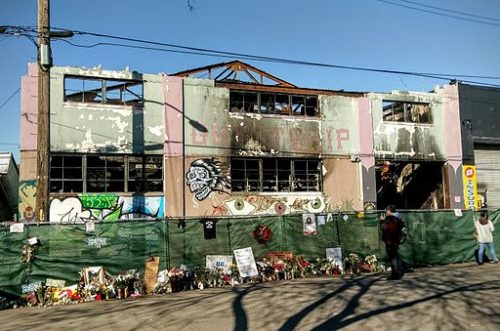
January 24, 2017; San Jose Mercury News
After the multiple fatalities in the wake of the Ghost Ship warehouse fire in Oakland, California, NPQ predicted many ripples in the arena of informal work/life spaces where many young artists create art communities and live and work relatively cheaply. For who that manage such places, the cities in which they sit, and the funders who support them, safety has become an immediate concern.
For no one is that more true than Elisabeth Setten, executive director of Art Works Downtown in San Rafael, California. The nonprofit is housed in an 1880s-era opera house that houses the nonprofit’s three galleries, 32 artist studios, and 17 low-income apartments. The space allows artists to live cheaply while creating and displaying their art and is the central engine in a revival of the downtown area. The historical building also had two other tenants: expensive electrical and structural issues caused by aging.
When 36 people perished in the Ghost Ship warehouse fire in Oakland in December, it hit too close to home for Setten. She told the Mercury News, “For artists to find housing and a place to work, they’ve had to cut corners. In the Bay Area, many artists live that kind of life. Most of the time you can get away with it. But when you can’t, you have a worst-case scenario like Ghost Ship. At one time, there were probably a lot of places like Ghost Ship in Marin.”
Sign up for our free newsletters
Subscribe to NPQ's newsletters to have our top stories delivered directly to your inbox.
By signing up, you agree to our privacy policy and terms of use, and to receive messages from NPQ and our partners.
Although they passed all safety inspections, Setten acknowledged Art Works was headed towards a health and safety issue. In this case, the city supported the nonprofit. After assisting with a plumbing upgrade, in November, amid what the Mayor of San Rafael noted as stiff competition, the city awarded the nonprofit $197,000 from a federal block grant to upgrade the ancient electrical system.
“The whole idea is to bring people to San Rafael to enjoy the downtown, and Art Works Downtown is an important part of that,” Mayor Gary Phillips told the Mercury News. “We helped them with their plumbing last year, and we assisted with the electrical because we were concerned about the fire danger. It’s right in the middle of our west end, an important location for us.”
Meanwhile, a crowdfunding campaign headed by the Gray Area Foundation for the Arts yielded $900,000 for the victims of the Ghost Ship fire, which killed 36 people and injured dozens of others. It is unclear if anyone has received any of the funds, and with the February 2nd two-month anniversary approaching, some in the community are getting nervous about just when the money will be issued and who will benefit. A press release from Gray Area on January 25th confirmed that it had received some 400 applications for relief, out of which 136 were qualified to draw from the $900,000 donated. Intake forms continue to be available on the foundation’s website until early March. The relief allocation was intended for victims injured in the fire, the biological families of the deceased victims, and tenants of the warehouse that have been displaced.
There is an ample body of work to draw from in the nonprofit world when looking at what not to do with fund distribution after a tragedy. Survivors of the Oklahoma City bombing have a long and well-documented public struggle to get funds from an amply-founded multi-million dollar foundation set up to care for their healthcare and educational needs through the Oklahoma Community Foundation. The fund set up in Newtown, CT after the Sandy Hook tragedy led to a United Way in Connecticut taking a beating in the press over slow distribution, which they did not have complete control over. The local leadership even had to even confirm to the press that they did not know in advance about the shooting when a flawed Google algorithm showed a community fund being set up three days before the national tragedy. The Newtown families urged donations made to support the Orlando Pulse Nightclub shooting victims and survivors be made directly to the families after their experience.—Carrie Collins-Fadell











